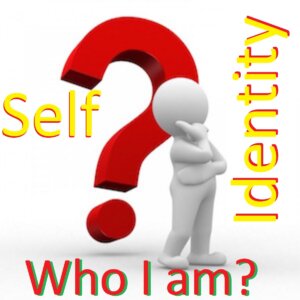Self-Identity, Who I am ?
Self-Identity

What is the meaning of self-identity?
It all starts when you are born and your parents give you a name. As you grow up, other people start to add adjectives like “tall,” “short,” or “blonde.” You start to build this idea of what makes you who you are; it forms the foundation for your self-concept and self-esteem. Self-concept is basically how you perceive yourself and what you think about your attributes, whereas self-esteem is the value you place on those attributes.
As we go through life, we base our Self Identity on our environment and the people in it. We change ourselves according to others’ needs and characteristics that they want us to possess because we do not want them to reject or dislike us. One way this Self Identity starts to appear is during childhood. The parent might tell their child that he/she will never be able to do something because of his/her inability (ex: a child can’t reach a shelf). This leads the child to believe that he/she won’t able to accomplish tasks like others and they will always be flawed. Self Identity consists of wanting to belong and to initially satisfy your needs by yourself, but later on it progresses into a longing to gain acceptance from others. Self Identity is somewhat similar to self-awareness because Self Awareness is an understanding that one has of oneself whereas Self Identity is a summation of what you believe about yourself.
Self Identities develop from our physical appearance as well as our interests and talents. People with high levels of intelligence tend to have higher levels of Self Esteem compared with those who possess lower intelligence levels, therefore having a higher Self Identity. Self-Identity also varies with age because many Self-Esteem needs are met during childhood, however, Self Identity has been shown to become more evident by puberty and continues to increase through the adolescent years.
People who have high levels of Self Esteem tend to experience lower levels of Self Identity due to their reliance on people’s approval meaning that they will believe in what other people think about them, rather than knowing what they actually think about themselves. On the other hand, people who have low Self Esteem tend to gain higher Self Identities because their poor image of themselves leads them to crave recognition from others thus making it easier for others’ opinions to influence their own.
Adolescents often struggle when determining self-identity because it is a period of time where there is almost constant physical and mental change. Self-identity can be defined as “an individual’s concept or sense of who they are, their personality and individuality” (http://www.simplypsychology.org/self-concept.html). This constantly changing self-definition often makes adolescents insecure and they may question the nature and existence of self-identity and themselves, obtaining Self Esteem. Self Identity might be described as an internalized image that one has of oneself. However, this internalized image varies between different cultures depending on what each culture considers to be important for Self Identity. For example, in some African American cultures being athletic is valued much more than academics whereas in Asian cultures being a high academic achiever is more important than athletic abilities. Self Identity is made up of several components that help to describe the self, including Self Esteem and Self Efficacy Self Identity is often confused with Self Esteem even though they are very different concepts. Self-Esteem uses the term “self” in reference to an individual’s evaluation of his or her own worth whereas Self Identity refers specifically to how an individual defines him or herself based on personal characteristics such as one’s race, ethnicity, gender, and sexual orientation (http://www.simplypsychology.org/self-concept.html).
Similarities:
Both Self Identity and Self Esteem represent how much positive regard and value one places on themselves. Self Esteem and Self Identity both reflect how individuals see themselves in comparison to others Self Esteem is typically related to self-appraisal (assessment of one’s worth) Self Identity is often confused with Self Esteem even though they are very different concepts. Self-Esteem uses the term “self” in reference to an individual’s evaluation of his or her own worth whereas Self Identity refers specifically to how an individual defines him or herself based on personal characteristics such as one’s race, ethnicity, gender, and sexual orientation (http://www.simplypsychology.org/self-concept.html).
Differences:
The difference between Self Identity and Self Esteem is that Self Esteem is the opinion of Self that an individual possesses whereas Self Identity is a sense of belonging based on personal characteristics such as one’s race, ethnicity, gender, and sexual orientation.



